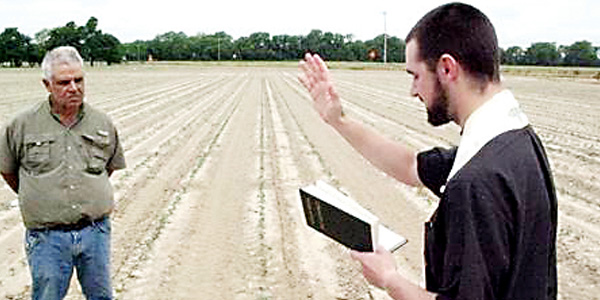By Catherine Cook
JACKSON – The four Catholic high schools within the Diocese of Jackson graduated 177 young men and women this year. The history of these schools dates back to the mid-1800s, so, the graduates of 2016 join a long list of persons formed in faith and educated for the world in the Catholic schools of Mississippi.
Our graduates collectively earned $13.4 million in scholarships based on their academic and athletic performances, as well as their leadership and community service. Our 2016 graduating class is a diverse group – racially, economically, and yes, religiously. Seventy-one percent are Caucasian and the remaining 29 percent are African- American and other ethnic backgrounds. Fifty percent are from other faith traditions. Our students are diverse, too, in their talents and interests. As Superintendent I am proud of the teachers, administrators and students who work hard to form the students who will go on to become our leaders, educators and the future of the Church. Thank you to all parents, alumni, and patrons who support the ministry of Catholic education in our schools. Congratulations to the class of 2016!
(Catherine Cook is the diocesan Superintendent of Catholic Schools.)
GREENVILLE ST. JOSEPH
VALEDICTORIAN: Virginia French Virden
GPA: : 4.3538 – ACT: 29
From her speech: The memories that fill my mind when I think of St. Joe will forever be filled with this class. You are the people who have inspired me the most, and I can not thank you all enough for that.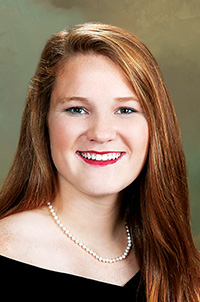
… I ultimately decided on being myself and trying my best to put into words the unconditional love I have for the school that built me and the people that surround me. I wanted my class to know how much they mean to me and how highly I think of each and every one of them. I wanted them to know the joy I have when seeing their smiling faces and the sadness I will feel when we will all go our separate ways. But ultimately, I wanted them to know the huge impact they have had on my life and on me becoming the person I am today. I cannot describe in enough words the life-changing impact you all have had on me but it will forever be in my heart. … It is finally our time, let’s make the most of it.
Member of St. Joseph Catholic Parish
Scholarships: Southern Methodist University, Francis P. and Annie C. Unkel Trust Scholarship, National Honor Society Semi-Finalist. Virden was offered an additional $259,980 in scholarship funds to seven universities in the Southeast.
Awards/honors: STAR Student; National Honor Society (president), Wendy’s Heisman School Winner, Class Officer (9-12), SJS Ambassador, Mayor’s Youth Council, Youth Retreat Team Leader (9-12), Mu Alpha Theta, The Society of Torch and Laurel, Delta Democrat Times Star Scholar, Guaranty Bank Guaranteed Achiever, Principal’s List, Homecoming Court, Mississippi HOBY representative, Girls’ State (elected Chancery Court Clerk), Tennis – Girls’ State Singles Champ (2015), Doubles Champ (2013), Named St. Joseph Outstanding Senior Female Athlete.
Activities: tennis, soccer, cheering
Favorite subject: History
Favorite service project: Mayor’s Youth Council where she completed numerous service projects around the community while working with students from all area schools.
Plans to attend: Southern Methodist University to study political science.
SALUTATORIAN: Adrian Thomas Azar
GPA: 4.3196 – ACT: 33
From his speech: Going to St. Joseph’s has made a tremendous impact on my life, as I know it has on us all. St. Joe has given us the opportunity to excel and to be who we are. Throughout my years here, I have built lifelong friendships and have become very close with so many of you. Being here has allowed me to find a true love for the game of 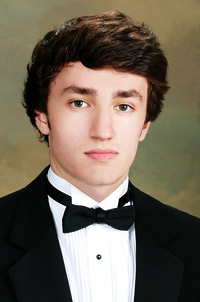 basketball and further enhance my education. The most important characteristic that Saint Joseph has to offer is its diversity. We are different in so many ways but still we have become so united. The bonds we have made will never be broken. We will always be like a family.
basketball and further enhance my education. The most important characteristic that Saint Joseph has to offer is its diversity. We are different in so many ways but still we have become so united. The bonds we have made will never be broken. We will always be like a family.
As we now prepare to venture on and take the next step in our lives, let’s reflect upon not only the great memories we have shared but also recognize those regrets we may have.
So my fellow graduates, we must make a commitment to never take anything for granted as we go our own separate ways. We all have a great purpose in our lives that with God’s help we can discover. We will accomplish great and daunting tasks.
Go out into the world and crave that success, because we never know when our time will run out. Going to St. Joe was the best thing that could have happened to me, so while we are on our individual journeys, we must keep one thing in mind: Don’t ever forget where we came from and who we came with, because we would not have gotten to this point in our lives without each other.
Member of St. Joseph Catholic Parish
Scholarships: University of Mississippi Academic Excellence, UM Bledsoe Scholarship, UM Salutatorian Scholarship, UM Competitive Edge Scholarship, UM Academic Excel Tech Award, Betty & Hodding Carter Family Foundation Scholarship, Washington County Ole Miss Scholarship, Mississippi Eminent Scholars Grant.
Awards/honors: Mu Alpha Theta, National Honor Society, Principal’s List, Mississippi Governor’s School Achievement Award, Scholars Bowl Championship Team (10th), Wendy’s High School Heisman School Winner, Winter Fest Court, Selected to compete in Academic Hoop Group Elite Program, Basketball MVP (2015 & 2016).
Activities: Basketball, golf
Favorite subject: History
Favorite service project: Delta Soul celebrity golf and charity event
Plans to attend: University of Mississippi to study biology/pre-medicine.
MADISON ST. JOSEPH
VALEDICTORIAN: JOSEPH COLLINS
GPA: 4.37 – ACT: 35
From his speech: By his graduation speech, Joseph Collins showed his fascination with heroes and told why stories about super heroes appeal to us. “I think it is because we know these outlandish stories are not too far from the truth . . . Why is it important to understand our relationship to our super powered fantasies? As we transition from high school to the next step in our lives we are undergoing an experience that parallels a hero’s first true victory.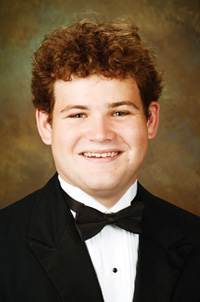
… However, as any comic fan knows, in the words of Uncle Ben, ‘With great power comes great responsibility.’ We cannot leave and forget the lessons we have learned. We must strive to develop our skills further, to continue to learn. We cannot stop helping others just because we do not have to turn in service hours anymore. We do not have to be able to fly or run faster than a speeding bullet in order to make a difference. We are graduating from a Catholic school after all. Our beliefs and our knowledge give us the power to affect real change, by setting examples, by caring for others. We will have to make sacrifices, to forgo comfort in favor of the right thing. It was Albus Dumbledore who said, “We must choose between what is easy and what is right.” So trust in us, you have taught us well. We may falter, but we will not abandon the path.
Member of St. Francis of Assisi Parish
Scholarships: University Scholar from Notre Dame, Presidential Scholar from Stevens Institute of Technology, Gustav Mesmer Scholarship from Washington University in St. Louis, Presidential Scholarship from Rhodes College, Blitz 16-BankPlus Scholar Athlete Scholarship, BankPlus 360 Scholarship.
Awards/honors: Elected Lt. Governor of American Legion Mississippi Boys State, alternate to American Legion Boys Nation, selected as counselor to American Legion Boys State, Scholar Athlete Award from St. Joe, Wendy’s Heisman winner, National Honor Society, President Mu Alpha Theta, National English Honor Society,
National Junior Classical League, State officer, swimming state champion: 100 freestyle, 400 freestyle relay, Most Valuable Swimmer, swim team captain, Most Valuable Bowler, Academic Excellence Awards, Service Award.
Activities: Band, orchestra for musical, swimming, bowling, reading.
Favorite service project: Dance Marathon “Bruinthon” for Children’s Hospital.
Plans to attend: University of Notre Dame to study mechanical engineering.
SALUTARORIAN: William Doherty
GPA: 4.24 – ACT: 31
From his speech: Both St. Joseph Catholic School and our families have given us a strong foundation for us as we venture into the next chapter of our lives. It is now up to us to take that foundation and build upon it. If we do not build upon this solid foundation, then we wasted our education. This will not be easy. There will be times when the going gets tough and you fall. The odds will be against you. You will want to give up because it is difficult. However, Bruce Wayne’s butler, Alfred, in “Batman Begins” tells us that we fall “So that we learn to pick ourselves up.”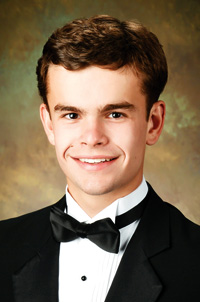
It is through failure that we find out who we are and what our purpose on this world is. So go out and try new things and do not worry about falling. Go be an underdog and beat the odds like Leicester City, who won the British Premier League with five thousand to one odds.
… Do not be afraid to fail, because if we have the courage to continue despite our failures, we will find success in each of our future endeavors.
Member of St. Richard Catholic Parish
Scholarships: Vice Presidential Scholarship at St. Louis University (SLU), Higher Purpose Scholarship at SLU, Merit Scholar from Millsaps, Merit Scholar from Spring Hill College in Mobile, Ala.
Awards/honors: Delegate to American Legion Mississippi Boys State, Sportsmanship Award from St. Joseph, Principal’s Honor Roll, National Honor Society, Treasurer; Mu Alpha Theta, National English Honor Society, National Junior Classical League, Basketball tournament sportsmanship award, and Academic Excellence Awards.
Activities: Cross country, track, basketball, faith life youth group, Retreat Team.
Favorite subject: History
Favorite service project: Alive in You Project in Mobile.
Plans to attend: St. Louis University.
NATCHEZ CATHEDRAL SCHOOL
VALEDICTORIAN: DEJA HARRIS
GPA: 4.357 – ACT: 29
From her speech: In her speech, Harris shared three Major Key Alerts: First, prepare to fail. We are all going to fail at something in life. As cliché as it is, failure is a part of life; we all have to fail so that we know what not to do on our journey to success and happiness. In order to achieve success and happiness, we have to learn from our failures and not dwell on them.
Second Major Key Alert: Be loud and proud of what you believe in… Do not change or smother your views on an issue in order to please others. Most of my classmates have never had an issue with voicing his/her opinion. You have to remain true to yourself although, there will be situations in which doing so seems difficult. We should never be afraid to express how you feel; however, you should respect those whose opinion may differ from yours.
(Third) Major Key Alert: Spread your blessings. Remain open to helping and serving others… We all have a mission in life that is not quantified by the amount of money we make, the status or position we hold, or the materials we possess, but by the difference we make in other people’s lives, our imprint on society, and how well we serve God.
Member of Spiritual Filled Life Christian Church
Scholarships: Scholarship to Loyola Marymount University, $172,000, over 4 years.
Awards/honors:
Activities: Voted Most Likely to Succeed, state winner at Science Olympiad Competition, president of the Key Club.
Favorite service project: Kids Against Hunger meal packing project.
Plans to attend: Tougaloo College to study art and minor in psychology.
SALUTARORIAN: Addie Netterville
GPA: 4.259 – ACT: 27
From her speech: When I was just a baby, I almost lost my life — I was born prematurely. However, through fluent prayer, I survived the near fatal experience. Throughout my younger years, I was diagnosed with a speech and language disability.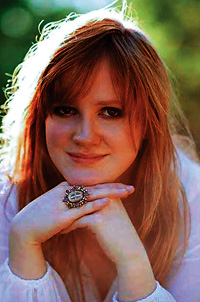
Tonight, Class of 2016, I challenge you to dare the “impossible.” I challenge you to not be bound by your limitations, to not accept the “diagnosis,” and to not accept what others believe about you. My parents and I refused to accept that I was “disabled.” We chose, and believed, that I was “healed,” because the “Holy One,” God the Father, says that I am “healed.”
Each of us was appointed by God for a specific mission — to serve Him, to love Him, to spread the Word of God, and to live life for His Glory. Let no man discourage you, be discouraged by no one. In life, we are born. In life, we die. We each have limitations, which, through God, we overcome and are healed. All we have to do is ask God for help, which we may not receive instantly, or verbally. However, through another person’s kind words, actions, and over time, we shall receive God’s confirmation — we received the victory.
Prepare, Class of 2016, because tonight, you become young men and women — it’s time to grow, to put aside foolishness, because the choices you make will affect you for the rest of your life.
Member of Church of God
Scholarships: Millsaps College, $26,000, per semester for 4 years.
Awards/honors: Inducted into the National Honor Society, A average all 4 years Science National.
Activities: Writing, poetry, devoting time to God, soccer and writing music.
Favorite subject: college algebra, trigonometry and speech:
Favorite service project: Natchez Children’s Home
Plans to attend: Grand Canyon University to study bio-medical engineering.
VICKSBURG ST. ALOYSIUS
VALEDICTORIAN: KATIE MARTIN
GPA: 4.76 – ACT: 34
From her speech: I am honored to be the valedictorian of the Class of 2016. To all of our dedicated teachers and coaches, thank you for teaching us, inspiring us, and encouraging us to be better than we thought we could be.
… Growth and improvement are part of the expectations for the St. Al swim team. My St. Al swim coach, Coach Bruce Ebersole, always reminds the swim team to “Make the little things count.” The only way to improve in swimming is to make small consistent 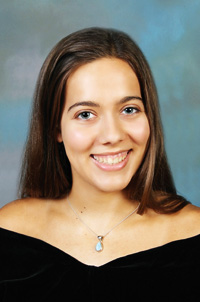 improvements. In a sport where milliseconds separate the medalists, those little things make all the difference.
improvements. In a sport where milliseconds separate the medalists, those little things make all the difference.
Focusing on little things also applies to life. Whether it is spending 10 minutes developing a relationship or a moment throwing away a piece of trash, those little things will accumulate into a stronger relationship and a healthier environment.
We are what we do often and since we live one second at a time, the only way to change anything is through the little things. Focus on the little things – those small choices will determine how you change the world.
I have always liked the Irish blessing the priests use, so I will close with this:
May the road rise to meet you,
May the wind be always at your back.
May the sun shine warmly upon your face,
The rains fall softly upon your fields.
And until we meet again,
May God hold you in the palm of his hand.
Member of The Church of the
Holy Trinity Episcopal Church
Scholarships: Accepted: Knights of Columbus Essay Scholarship, Purdue University Alumni Association and Presidential Scholarships, United Way Teen Help Bruce Alan Ebersole Jr. Scholarship. Others: William Carey University, Belhaven University, Mississippi College, Mississippi College Science and Mathematics Academic Scholarship, University of Rochester Xerox, University of Mississippi Academic Scholarship, Mississippi State University Academic Scholarship, University Illinois Academic Scholarship, U.S. Military Academy Scholarship.
Awards/honors: Mississippi Economic Council Star Student, Bronze Presidential Service Award, Math and Science Team, Academic Quiz Bowl, English, Social Studies, Science, Theology Awards, Gold A Award, National Honor Society, Mu Alpha Theta, 4.0 Presidential Award, Honor Graduate with Special Distinction.
Favorite subjects: math, science and English
Favorite service project: Camp Silvercloud with the Junior Auxiliary
Plans to attend: Purdue University to study engineering
SALUTATORIAN: Katelyn Brock
GPA: 4.65 – ACT: 28
From her speech: My classmates and I are excited to stand before you today as the St. Aloysius Class of 2016. During our time at St. Al, we have had special experiences with people that have helped us to grow into the men and women we are today.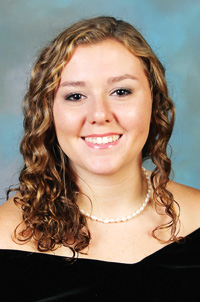
One word that I could use to sum up this class is determined. There isn’t a task we decide to do that we won’t try our hardest on. We are a class that takes the phrase “all or nothing” quite literally. The results may not be what we wanted them to be, but no one can ever say that we didn’t give our best efforts. As we move forward, I hope that we will keep this sense of determination with us and utilize it in whatever we may do.
At the beginning of senior year, Dr. Strickland gave us a challenge, and today I give you the same one. I dare you all to be great. In these next years, we won’t all be together, but I want to hear of all the wonderful things the Class of 2016 is doing. I dare you to be the absolute best version of you by giving everything you have to be great. Never give up and always keep fighting. We have learned many things at St. Aloysius and now I dare you to utilize those things to further you to greatness.
Member of Crawford Street United Methodist Church
Scholarships: Accepted: Merit Health River Region Joe and Feeney Elliot Scholarship, Mississippi College Science and Mathematics Academic Scholarship, Mississippi College Dean’s Scholarship.
Others: Louisiana Technical University Outstanding Student Bulldog Scholarship.
Awards/honors: ”I Dare You Award,” Gold Service Award, Gold A Award, National Honor Society, Mu Alpha Theta, and an Honor Graduate with Special Distinction, 4.0 Presidential Award.
Activities: Member of Swim Team, Retreat Team, Key Club, Mu Alpha Theta, NHS, President of Church Youth Group, Conference Council of Youth Ministry, Math and Science Team.
Favorite Subjects: Biology, all sciences.
Plans to attend: Mississippi College to study biology, pre-medicine to become a pediatrician.
Favorite service project: Good Shepherd Senior Service Project.

